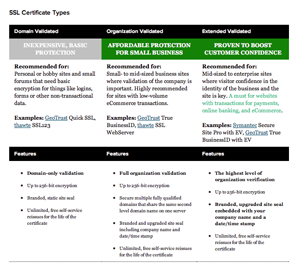This is by far the most common question in the minds of end-users.
The most successful way to sell SSL certificates to users who are unsure is this: Assess and suggest. That’s the best approach to offering SSL certificates to your customers because it ensures that you start with an understanding of the customer’s need, and end with selling the correct SSL certificate for their application.
Providing that bit of education and assistance – helping the customer to understand the various product differences and features – will go a long way in ensuring the customer ends up with the right solution.
Often times customers start down the purchase path by looking at price first and then features. Given that many of your potential customers don’t really know much about SSL other than knowing that they need one, price is going to be the biggest factor in their choice. That may mean they spend less, but it also means they will likely end up with the wrong SSL certificate for them. Unless you help them make that choice.

Offering the right solution, not the cheapest solution
There is a tendency to assume that the customer will only consider the least expensive option. That’s not the case. It’s really up to you to make sure that you present the right product for the customer.
I’ve heard from resellers that they feel dirty suggesting higher-priced certificates to their customers and that all SSL products are the same. While it’s true that the encryption provided by a domain validated certificate is as secure as what an extended validation certificate provides, it’s also true that there is much more to SSL than just encryption. Learn more.
Would you put one of your mid-sized business customers on your cheapest shared hosting packages? Or would you suggest the right solution for their needs even if that was a more expensive VPS or dedicated server package?
Selling a basic, domain-validated certificate to a mid-sized business that transacts online through their site is doing them a disservice. That business could reap real benefits from using a Symantec Secure Site Pro, which includes the well-recognized Norton Secured Seal that is proven to reduce abandonment and lift consumer confidence.
The customer may not know this, but you should. They come to you for advice on what is best for them. Educate yourself, understand the products, and then assess and suggest the right solution to your customers.
Assess and suggest
Here are some tips for how to help your customers get the right SSL certificate. The net result will be an increase in unit sales (because customers will feel confident in dealing with you), more sales in the higher-margin products (because customers want to buy the right product for their application) and happier customers (because customers will feel informed and empowered).
Assess: understand the customer’s need.
Are they a small business? Do they use their site for transactions? Would they benefit from the Norton Secured Seal? Is the site public facing?

At this stage, you are looking to develop an understanding of where the customer fits on the SSL product map. Remember that inexpensive domain validated certificates have a place in personal sites and internets, but also remember that small- and mid-sized businesses really should be using an organization or extended validated certificate.
Suggest: offer the right SSL certificate for their needs.
Your customers look to you for advice and expertise. Provide it to them and make sure you are offering the right solution for them.
If they are a small or mid-sized business, they should be using an organization validated certificate like a GeoTrust True BusinessID or a Symantec Secure Site Pro. If they have a shopping cart and do high volumes of transactions, then an extended validation certificate will help decrease cart abandonment and lift sales. Suggest a Symantec Secure Site Pro with EV and they can benefit from the Norton Secured Seal.
